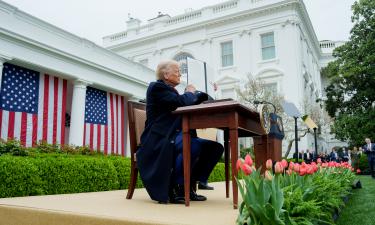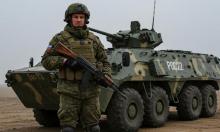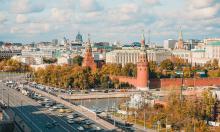Diana Johnstone: Yugoslavia. IN A SPIN
The "October surprise" that brought a change of power in Belgrade was actually two events, one superimposed on the other. One was a democratic election, made in Serbia. The other was a totally undemocratic putsch, made in the "international community", otherwise known as NATOland. The democratic election would have been sufficient to oblige Slobodan Milosevic to retire as Yugoslav President. The majority of Yugoslav voters had long wished a change in leadership, and Vojislav Kostunica emerged as an acceptable alternative. But the NATO-backed putschists wanted more. They wanted two things that the legal elections could not provide: a dramatic media spectacle that would fit the Western "spin", and a seizure of power beyond the limited powers of the Yugoslav presidency.
The Democratic Election
The Yugoslav elections were called by Milosevic himself. Having been elected President of Serbia in the country's first multi-party elections in 1990, the "dictator" had followed the constitutional rules and left the Serbian presidency at the end of his second term, whereupon he was elected by the Yugoslav parliament to the mainly symbolic office of Yugoslav president. Having sponsored a constitutional change which would allow him to be re-elected, but by universal suffrage, he went on to call early elections, months before his term was to run out in mid-2001. Milosevic was lured into this move by advisors pointing to deceptive public opinion polls indicating that he could win by a margin of 150,000 votes in the autumn, before winter hardships turned voters against him. This is similar to the "joke" played on French president Jacques Chirac, who called the early elections that brought his left opposition headed by Lionel Jospin into office. In Paris, it is even rumored that it was a French advisor who urged Milosevic to make this fatal error. In short, Milosevic was not a "dictator" but a calculating politician trying to stay in office in a multi-party electoral system he had largely introduced. Aware that his popularity ratings had long been in decline, he counted on several factors to help him get the necessary 50% of the vote to be re-elected President of Yugoslavia. These were the chronic squabbling of the so-called "democratic" (meaning bourgeois, as the Swedes call the center right) opposition and the public rejection of its main leaders (especially Democratic Party leader Zoran Djindjic); the fact that Montenegrin president Milo Djukanovic was sure to call for a boycott of the elections as part of his secession strategy, which would leave only pro-Milosevic voters willing to go to improvised polling stations; the prospect of a couple of hundred thousand solid votes from Kosovo constituencies (where ethnic Albanians would, as usual, boycott the election) and from the armed forces. Aware of its weakness, the opposition which had first loudly demanded early elections then threatened to boycott them, claiming that they would be rigged by Milosevic. The NATOland chorus joined in, proclaiming that Yugoslav elections would not be "fair and free" and that Milosevic was certain to cheat. In fact, thanks to a normal democratic system of multi-party supervisors at polling stations, cheating in Yugoslav elections was nearly impossible in Serbia proper, except perhaps for the hundred thousand or so soldiers who vote in barracks. Kosovo and Montenegro offered limited opportunities for cheating only because of the obstructionism of the separatists. In the end, Milosevic was a whopping 700,000 votes short. Official results gave Kostunica over 48% of the vote in a five-man race. This fell slightly short of the 50% required to win, but indicated an almost certain landslide in the runoff against Milosevic, who trailed by some ten percentage points. (Yugoslav electoral law calls for a second round if no candidate wins an absolute majority in the first round.) Here is where both sides contributed to a confusion that gave an opportunity to the putschists to move to steal the election. Apparently in a state of shock, the government announced the results slowly and without complete details. The "Democratic Opposition in Serbia" (DOS) backing Kostunica demanded recognition of a claimed first round victory and announced it would boycott the second round. This raised the danger of a second round that Milosevic could win by default. The prospect of two winners -- one in the first round, the other in the second - would have created a dangerous civil war situation, favorable to NATO intervention. Kostunica's backers argued that since Milosevic had cheated in the first round, he would cheat even more in the second -- this was not plausible, but widely believed anyway, as the demonization of the former leader and future scapegoat picked up momentum. The DOS thereby moved the contest from the ballot box into the streets, where "the people" would demand recognition of Kostunica's election. This prepared the way for power - and property -- to change hands amid confusion and violence. Neither the police nor the Army was willing to support Milosevic against a patriotic Serb like Kostunica who had won popular support in a legal election. Their neutrality seems to have been ensured by the influence of two key figures dismissed by Milosevic two years ago, former security chief Jovica Stanisic and former army chief of staff Momcilo Perisic, who retained friends and influence in the police and the armed forces respectively. The rallying of other figures who had been part of the Milosevic power structure was hastened by Kostunica's reiterated assurances that there would be no vengeance. Former Milosevic followers began flocking to the side of Kostunica seeking protection from his short-run supporter and long-term rival, Zoran Djindjic, well known as Germany's man in Serbia. Thus Kostunica gained the Yugoslav presidency both because he was not Milosevic and because he was not Djindjic. But Djindjic has been strikingly active in grabbing the substance of victory away from the successful DOS candidate.
The Media Spectacle
It is arguable that Kostunica - considered the most honest of political leaders - could have won the presidential election just as easily (more easily, some supporters claim) if the United States and its NATO allies had refrained from pumping millions of dollars and deutschmarks into the country to support what they called "the democratic opposition". But it is far less likely that without all that excess cash, we would have been treated to the spectacle of the October 5th "democratic revolution", when a large crowd stormed the venerable Skupstina, the parliament building in the center of Belgrade. That event, presented to the world public as the most spontaneous act of self-liberation, was probably the single most planned act of all. It was staged for the TV cameras which filmed and relayed the same scenes over and over again: youths breaking through windows, flags waving, flames rising, smoke enveloping what some newspapers described as "the symbol of the Milosevic regime".
This was utter nonsense. It was like calling Big Ben the "symbol of the Blair regime" or the Capitol the "symbol of the Clinton regime". But the Western spinners needed symbols and drama for the latest episode in the hit TV fiction series of the 1990s starring the "genocidal dictator", Slobodan Milosevic. It wouldn't do for "Europe's last communist dictator" simply to lose a democratic election. Something more exalted was needed. So there was an attempt to revive a hit drama of a decade earlier, the "fall of Ceaucescu", which was also contrived and staged. If Milosevic and his wife met the same bloody fate as the Rumanian ruling couple, that would be "proof" enough for the media that they were equivalent to the dictator couple of Bucharest. But they weren't and fortunately it didn't happen quite like that. In Belgrade there was no equivalent of the Securitate (Rumanian secret police) to stage the drama. There was only a gang of toughs bussed in from Cacak, as the town's mayor later boasted to Western media, who led the mob up the Skupstina steps and easily broke into the scarcely guarded building, which was systematically vandalized and set on fire, causing considerable damage to public property. The liberators then went on to smash shop windows and steal property in nearby shopping streets. This failed to provoke the bloodshed that would have improved the TV show, but the vandals did their best. The fiercely anti-communist mayor of Cacak, Velimir Ilic, told the French news agency AFP that his armed "commando" of 2,000 men had set out quite deliberately on October 5 to "take control of the key institutions of the regime, including the parliament and the television". "Our action had been prepared in advance. Among my men were ex-parachute troops, former army and police officers as well as men who had fought in special forces," he told AFP. "A number of us wore bullet-proof vests and carried weapons", he added proudly. Ilic said contact was maintained throughout the action with high police and Interior Ministry officials, but that president-elect Kostunica was unaware of what was going on. "We were afraid he'd be opposed", said Ilic. And indeed, when he got word of what was going on, Kostunica by all accounts prevented the commandos from hunting down Milosevic and giving their spectacle a bloody finale. Some of these former "special forces" commandos included veterans of the civil wars in Croatia and Bosnia. The peak of irony lies in the fact that such paramilitaries, primarily responsible for giving the Serbian people the (unjustified) reputation of "ethnic cleansers" and war criminals, were instantly promoted by Western media into heroes of an inspiring "democratic revolution". But there is a consistency about it: the same tiny group of men are able to perform for world media as an exaggerated caricature of "the Serbs", first as villains, later as heroes. The ordinary citizens of Belgrade deplored the violence of October 5th, as they had deplored the violence of the civil wars. And the large crowds who gathered in Belgrade squares to support their candidate, Kostunica, were blissfully unaware of how they were being used as extras in an international TV production.
Violence Versus Votes The law-abiding citizens of Belgrade were also unaware of how the euphoria in the streets would provide cover for an ongoing campaign of violence and intimidation aimed at changing the whole power structure in Serbia, outside of any democratic or legal process. The Skupstina that was targeted for vandalism was not "the symbol of Milosevic's regime" but a parliament where the Socialist Party and its allies still had a duly elected majority. The "democratic revolution" in the streets did not attack a Bastille prison to liberate dissenters, but the seat of the democratically elected representatives of the people. The mob ransacked and set fire to the federal Electoral Commission offices inside the Skupstina, reportedly setting fire to ballots collected there, making it highly unlikely that the disputed first round score will ever be satisfactorily clarified. The spectacle enabled the managers of street violence to claim the "democratic revolution" as their own, openly attempting to relegate Kostunica to a figurehead role. Since then, throughout the country, Socialist Party headquarters have been assaulted and demolished, officials have been beaten and expelled from their functions by gangs of "democrats". The most lucrative enterprises have been seized. Strange parallel governments called "crisis headquarters" have been set up without any democratic mandate to redistribute property and offices. The "revolutionaries" can be sure the NATO benefactors of Serbian democracy will not ask for their money back so long as they target the left, which is identified only as "the Milosevic regime". The clear lesson: "democracy" is not defined by elections, but by NATO approval. Methods don't matter. The end justifies the means.
The Economy, Stupid
For many years, the alternate currency in Serbia has been the Deutschmark, traded on every street corner by men murmuring "devize, devize". During the weeks leading up to the fall of Milosevic, so many D-marks have flooded into the country that the precious currency recently lost half its value. Everyone believes that most of this money flows in through Djindjic. It seems to have been spent less on the election (Yugoslav election campaigns are not the expensive affairs run in the United States) than on preparing aspects of "the putsch" that followed: the forceful takeover of media by "independent" (i.e., NATO-approved) journalists, of key businesses and official positions which has been going on since the October 5 arson of the Skupstina. The European Union has moved quickly to lift some economic sanctions against Serbia and Madeleine Albright has also proclaimed the need to give the Serbian people "some dividends out of democracy" and to help President Kostunica. "We want to support him, we want to get assistance to him. I've been talking to our European partners. We will be lifting certain economic sanctions to make sure that the people can recover and the Danube is cleared," she declared.
Here the key word is "Danube". NATO bombing destroyed Serb bridges and blocked the Danube to European shipping, much of it German. The priority for Germany is to reopen the Danube, and it is for this purpose that important funds will be provided. To be precise, funds will be lent: Western generosity will take its usual form of the "debt trap", and Yugoslav public services will have to be cut back for years to come in order to repay the Western powers for rebuilding the transportation structure they themselves destroyed. The reconstructed transportation structure will be used to ship other people's commercial goods through the country to other people's markets. The "democratic dividend" will mainly benefit German business. But for the moment, the Serbian voters do not want to worry about that. They have been bombed, isolated, sanctioned, banned from traveling to other countries, reduced to poverty and treated as pariahs. Their main "crime" was to have wanted to preserve multiethnic Yugoslavia and to have been reluctant to give up all the benefits of self-management socialism in favor of the "shock treatment" impoverishing people in Russia and neighboring Bulgaria. Since Yugoslavia was not part of the Soviet bloc, its people were slow to realize that the defeat of the Soviet bloc meant that they too had to bow to the dictates of the West. Now they can dream of being "normal" Europeans again. For a relatively small minority, the dream of prosperity will no doubt come true. For others, there will be some unpleasant surprises. But that doesn't matter now. People have had enough of not being paid their wages more than a couple of months out of the year, of having to heat only one room, of shortages and travel bans. Young people, especially, want to live like other Europeans of their generation "People in Serbia are not looking for the truth", observed Serbian writer Milan Ratkovic, who lives in Paris. "They are looking for comforting lies." From being portrayed as monsters, the Serbs are suddenly being celebrated by Western media as heroes. They can turn on Western TV and see heroic images of themselves. "Look," says Ratkovic, "we held out longer than anybody else in Eastern Europe. Against us, the West had to use all its weapons and all its tricks." Sometimes the only way to solve a problem is to change problems.
by Diana Johnstone 2000-10-16
Subscribe to Pravda.Ru Telegram channel, Facebook, RSS!





